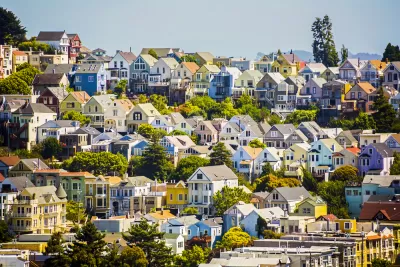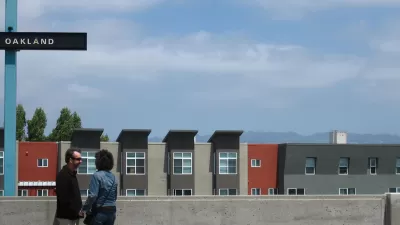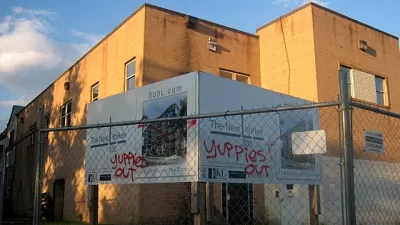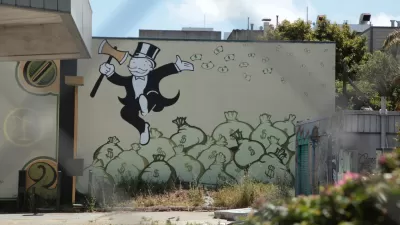Using a mid 20th-century painting as his point of reference, Benjamin Schneider points out that the vast, disruptive changes we often associate with San Francisco are only affecting the city's eastern side.

Urban change isn't equally distributed in San Francisco, Benjamin Schneider writes. "The city that so fascinates out-of-town journalists, tourists, well-compensated newcomers, and, apparently, news consumers around the world is actually only half of San Francisco. The other half [...] continues to be characterized by a suburban landscape and a suburban way of life that has remained basically unchanged for half a century or more."
Schneider argues that the vast changes taking place in neighborhoods like the Mission, SoMa, and Hayes Valley are partly attributable to an "utter lack of change across the west side." He goes on, "Due to outdated zoning laws and an inordinate amount of political power, the wealthiest, least dense neighborhoods have all too successfully shielded themselves from desperately needed new housing and homeless services, leaving a handful of east-side neighborhoods to bear these burdens for the entire city."
"This dynamic—of enormous change in low-income, often non-white neighborhoods close to downtown and virtually no change at all in upper- and upper-middle-class neighborhoods a bit farther out—is in force throughout the Bay Area, California, and major cities across the country."
Schneider concludes that we need a new way to talk about urban change, one that acknowledges the complicity of "rich people militantly preserving their way of life and physical surroundings" when problems like homelessness and displacement affect other parts of the city.
FULL STORY: What we talk about when we talk about urban change

Planetizen Federal Action Tracker
A weekly monitor of how Trump’s orders and actions are impacting planners and planning in America.

Maui's Vacation Rental Debate Turns Ugly
Verbal attacks, misinformation campaigns and fistfights plague a high-stakes debate to convert thousands of vacation rentals into long-term housing.

Restaurant Patios Were a Pandemic Win — Why Were They so Hard to Keep?
Social distancing requirements and changes in travel patterns prompted cities to pilot new uses for street and sidewalk space. Then it got complicated.

In California Battle of Housing vs. Environment, Housing Just Won
A new state law significantly limits the power of CEQA, an environmental review law that served as a powerful tool for blocking new development.

Boulder Eliminates Parking Minimums Citywide
Officials estimate the cost of building a single underground parking space at up to $100,000.

Orange County, Florida Adopts Largest US “Sprawl Repair” Code
The ‘Orange Code’ seeks to rectify decades of sprawl-inducing, car-oriented development.
Urban Design for Planners 1: Software Tools
This six-course series explores essential urban design concepts using open source software and equips planners with the tools they need to participate fully in the urban design process.
Planning for Universal Design
Learn the tools for implementing Universal Design in planning regulations.
Heyer Gruel & Associates PA
JM Goldson LLC
Custer County Colorado
City of Camden Redevelopment Agency
City of Astoria
Transportation Research & Education Center (TREC) at Portland State University
Jefferson Parish Government
Camden Redevelopment Agency
City of Claremont





























